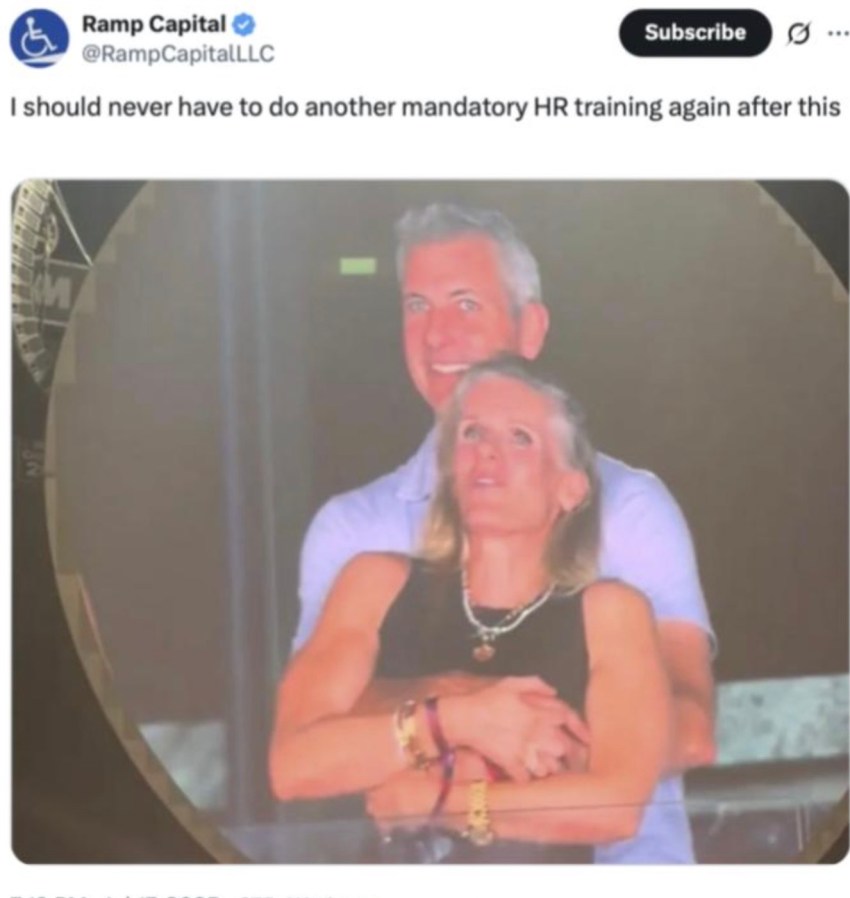
A Relationship Expert Breaks Down The Coldplay Concert Corporate Affair
By now, you’ve probably seen the headlines, the TikToks, the memes—Andy Byron, a married CEO, and Kristin Cabot, the head of HR (yes, HR) at Astronomer, were caught having an affair at a Coldplay concert.

Because nothing says “company culture” like dry humping your coworker on the Jumbotron.
First—a little learning moment. If you’re ever caught doing something shameful, play it off like it’s nothing. You know that trick where you trip and fall but keep walking like you meant to do that? That’s the move. If they had just leaned into the moment—kept cuddling, smiling, looking unbothered—no one would’ve paid attention. No one would’ve known who they were.
But no. They ducked, panicked, and gave the world’s biggest “we’re doing something wrong” energy. Even Chris Martin called it out from stage, joking: “Either these people are having an affair or they’re very shy.” Well, spoiler alert! They weren’t shy.
Now the fallout is massive. He’s resigned as CEO. Families are humiliated and devastated. And the internet has made them main characters in a drama they probably wish they could erase.
But what can we actually learn from all this?
Let’s discuss.
Why Do People Cheat?
Despite what we want to believe, people don’t usually cheat because they’re madly in love with someone else. It’s not always about attraction, or even a deep connection. Most often, people cheat because they want to feel alive.
They want intensity, excitement, escape. That rush of dopamine that makes them feel special, seen, or powerful again, especially when life has started to feel dull, predictable, or emotionally disconnected.
And when you add in the forbidden nature of an affair—especially one in the workplace—it multiplies the thrill. The secrecy. The risk. The sense of “we’re doing something we shouldn’t.” That’s intoxicating for some people.
Biologically, novelty spikes dopamine. It’s why we crave newness, adventure, or that first-kiss spark. An affair offers a shortcut to that feeling, but without the actual vulnerability, repair, or depth required in a long-term relationship.
Why People Risk It All for Affairs That Don’t Even Make Sense
There’s a name for this: limerence—a state of obsessive infatuation where you assign deep meaning to a connection that might not actually be that deep. You convince yourself this person gets you, that this is fate, that it must mean something… because the feelings are so intense.
But often, it’s not love—it’s fantasy.
And here’s where the 80/20 rule comes in. In most healthy relationships, you’ll get about 80% of your needs met. That’s normal. No one person is going to check every single box. But when things feel a little off, or life gets stressful, and then someone new enters the picture—someone who just so happens to fulfill the 20% you’re missing? Suddenly, that 20% can look like 100%.
It feels like you’ve found the one. You feel seen, alive, validated.
So maybe you start an affair. Maybe you even leave your relationship, convinced this is it. But here’s the problem: the person who filled in your missing 20%? That’s likely all they can give. You thought you were trading up… but now you’re in a deficit.
It’s not 100%—it’s just a shiny slice of something that felt good in the moment.
That’s the trap of affairs that don’t make sense…the thrill hijacks your logic. The ego boost disguises itself as connection and the longing for more leads you to chase what was never going to sustain you in the first place.
Work + Romance = Complicated
Office romance has always been a thing—but this one came with Coldplay, camera angles, and the entire internet as your accountability partner. HR must’ve had a hell of a time… oh wait.
There’s a reason workplace affairs are common, especially in high-pressure environments. Proximity breeds intimacy. You spend more time with colleagues than with your own family sometimes. You bond over deadlines, stress, jokes, long hours. That closeness can blur boundaries fast.
And research supports this. Studies show that repeated exposure to someone over time—the mere exposure effect—can increase attraction, even when initial chemistry wasn’t strong. Add a little emotional support or flirtation, and things escalate.
It’s even trickier when power dynamics are involved. A CEO and head of HR? That’s a massive imbalance. It doesn’t just impact them, it affects the entire company culture, perceptions of fairness, and the safety of others in the workplace.
What This Really Teaches Us
1. Feelings aren’t facts. Just because something feels intense doesn’t mean it’s healthy, aligned, or worth detonating your life over. Infatuation can mimic love, but real love is steady. It’s not chaotic or adrenaline-fueled—it’s built on trust, safety, and mutual respect. That dizzying high you feel? It’s often chemistry mixed with fantasy, not compatibility.
2. We all crave aliveness—but there are better ways to access it.
Affairs offer a temporary hit of aliveness: the thrill, the secrecy, the escape. But real aliveness—the kind that nourishes you long-term—comes from living in integrity. It comes from purpose, creativity, deep friendships, fulfilling work, spiritual connection, and yes, romantic passion that isn’t wrapped in deceit. If your relationship feels dead, cheating isn’t the cure—resurrection starts with inner work.
3. Boundaries matter. Especially at work. Especially with someone else’s spouse. Especially when you’re literally in charge of enforcing the boundaries. (Kristin, girl. You had one job.) If you can’t trust yourself to uphold basic relational and ethical boundaries, it’s not passion—it’s self-sabotage. (And maybe avoid PDA at a sold-out Coldplay concert. Just saying.)
4. If you don’t want to be exposed, maybe don’t do things worth hiding. People get caught not because the world is always watching, but because shame has a way of revealing itself. The ducking, the panicking, the awkwardness…it’s not just bad optics. It’s a nervous system response to being out of alignment with your own values. When something’s hidden, it starts to rot. And eventually, it finds the light.
Moral of the story? If you’re going to risk it all, maybe don’t do it under Coldplay’s spotlight. Because karma has a front row seat—and she’s not shy with her camera.











